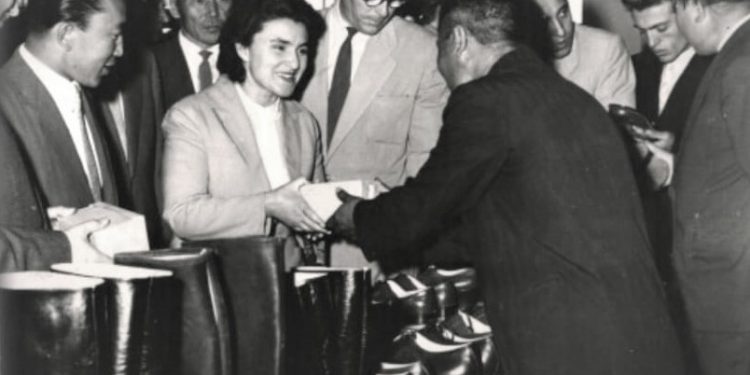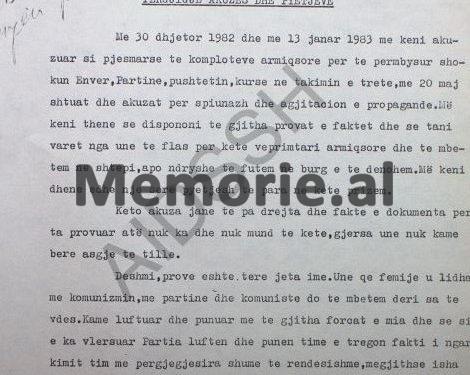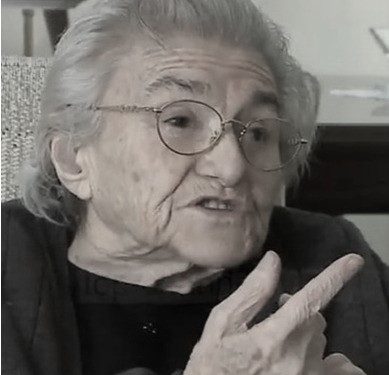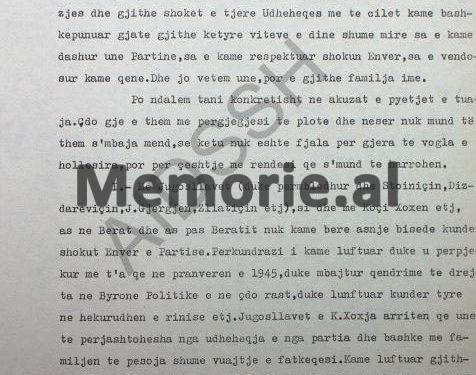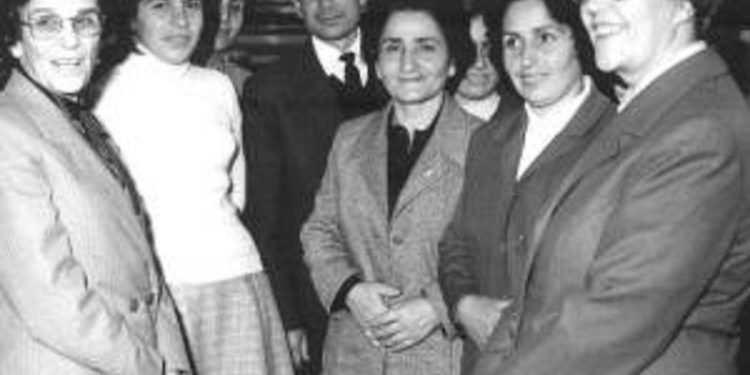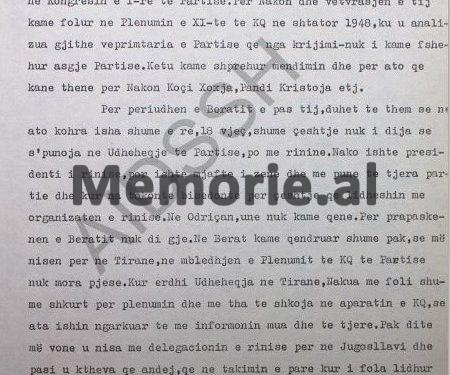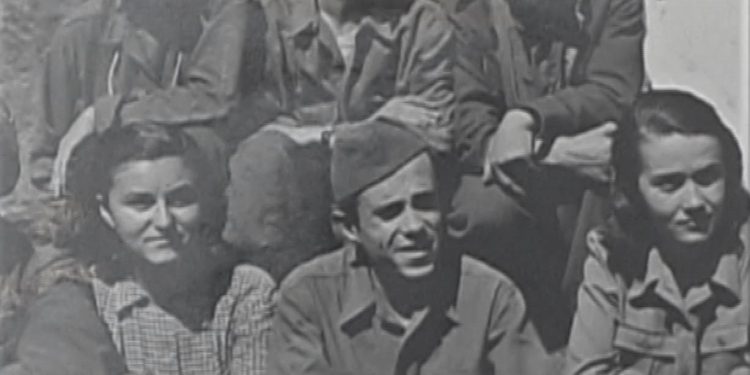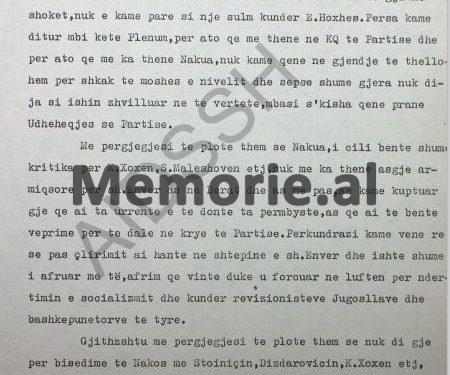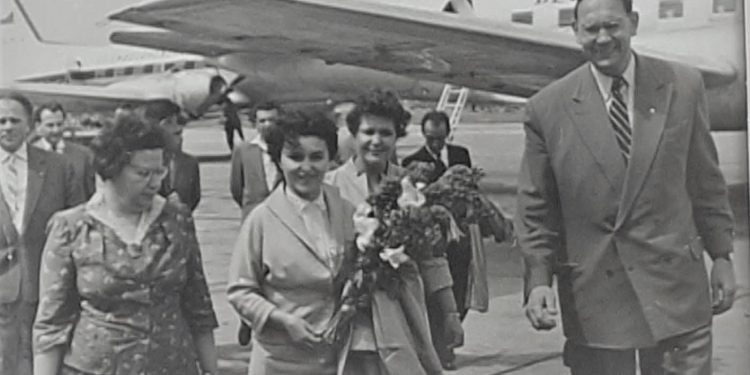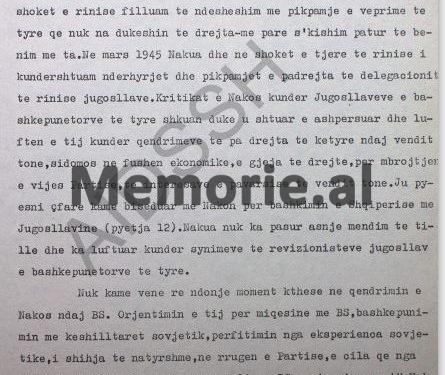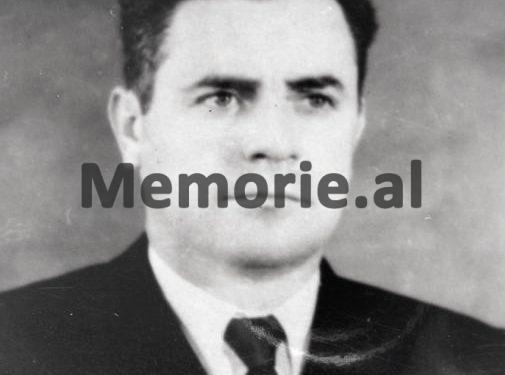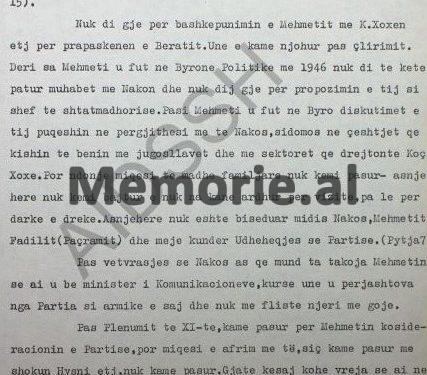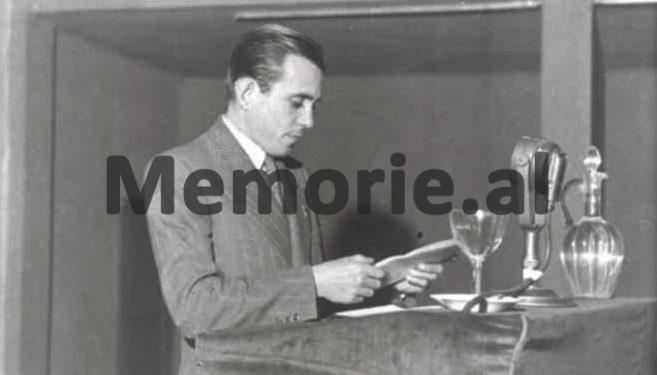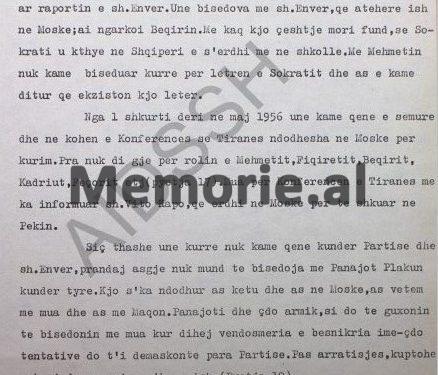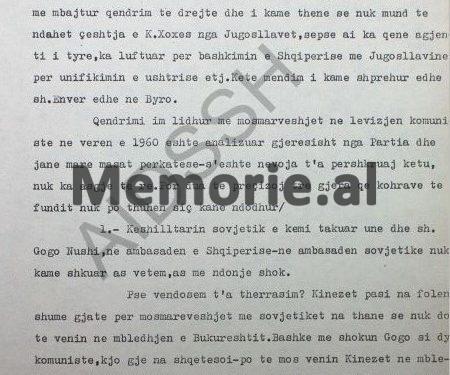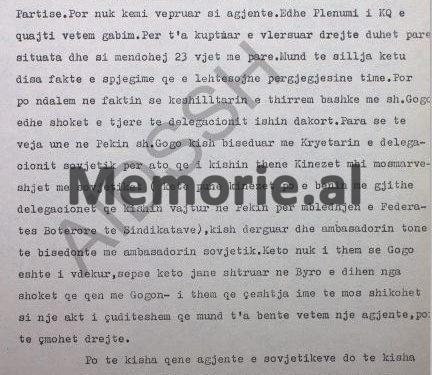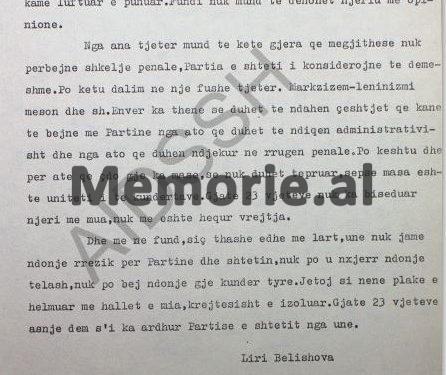By Dashnor Kaloçi
The first part
Memorie.al / In mid-October 1982, just a few days after the arrest of former Minister of the Interior Kadri Hazbiu and his deputy, Feçor Shehu, former Director of State Security, (who from 1980 to 82, also held the position of Minister of Internal Affairs), according to the orders of Enver Hoxha, given to Hekuran Isai, the secretary of the Central Committee of PPSh, who was assigned the position of Minister of Internal Affairs, in February of that year, a ‘Special Group’ was immediately created, under the Ministry of Internal Affairs, which would deal with: “the clarification of the hostile and agentic activity of Kadri Hazbiu’s group and his connections with the police agent Mehmet Shehu”.
At the head of that special group, which would be under the direct authority of the Minister of the Interior, Hekuran Isai was appointed the Director of State Security, Zylyftar Ramizi, who also held the post of Deputy Minister of Interior Affairs, and as his assistants were Hasan Ulqinaku and Enver Zeneli, both high officials of the State Security.
Immediately upon taking office, the ‘Special Group’ started work, where in addition to the investigative process against Kadri Hazbiu and Feçor Shehu, as well as other members of that “hostile group”, (including Nesti Nase, the former Minister of Labor of Foreign Affairs, Llambi Ziçishti, former Minister of Health, Mihallaq Ziçishti, former Major-General and Deputy Minister of the Interior, Llambi Peçini, former head of the Security and Physical Security sector of the senior leadership of the ALP, Fiqret Shehu , the wife of former Prime Minister Mehmet Shehu, with her two sons, Skenderi and Bashkimi, Elham Gjika, former head of the Tirana Investigation, Kristofor Martiro, former investigator who was involved in the investigation against Beqir Balluku, Gani Kodra, ex- head of the Security and Physical Security sector of the senior leadership of the APS, etc.), that group was also involved in opening the study of files for a number of former cadres and senior officials of the former leadership of the APS- party and state members, who from 1945 onwards were sentenced to prison or suffered in exile.
This was done to “discover and discredit the hostile activity of the agent group of Kadri Hazbiu and the poly-agent Mehmet Shehu”, and some of Enver Hoxha’s former closest associates, former members of Political Bureau of the Minister, as; Liri Belishova, Bedri Spahiu, Pandi Kristo, Kristo Themelko, Nesti Kerenxhi, Zoi Themeli, Gjin Marku, Maqo Çomo, etc. In this context, a large part of them who were interned, were arrested, another part was called to the investigator to testify, others were sent written questions, to testify on what they were asked for, etc.
Liri Belishovës, former member of the Political Bureau and secretary of the Central Committee of PPSh, (for propaganda, art and culture), who was interned since 1961 (while her husband, Maqo Çomo, was in Burrel prison), in December 1982 and January 1983, two letters were sent to her by the ‘Special Group’, under the Ministry of Internal Affairs, where some accusations and some questions were compiled, for her to answer in writing.
From the document in question, these letters to Liri Belishova coincide with a very difficult situation for her family, as she had just lost her only daughter (Drita Çomo, 20 years old, died of a serious illness in the Tirana Sanatorium) , where she was pressured, threatening her with arrest.
For more, it is known from this archival document that we are publishing below, which was extracted from a voluminous file of the Archive of the Ministry of Internal Affairs, (now part of the fund of the Authority for the Information of Files of the former Security of State), which is published for the first time by Memorie.al
THE SECRET DOCUMENT OF THE FIRST DIRECTORATE OF STATE INSURANCE, WITH THE FREE LETTER TO LIRI BELISHOVA, AS A RESPONSE TO THE ACCUSES MADE AGAINST HER BY THE OPERATIONAL GROUP UNDER THE MINISTRY OF INTERIOR AFFAIRS, “FOR DISCOVERING THE HOSTILE ACTIVITIES OF THE KADRI HAZBIUT AND MEHMET SHEHUT GROUP “
SECRET
Single specimens
Tirana, on 6.6.1983
ANSWERS TO THE ACCUSATION AND QUESTIONS
On December 30, 1982 and January 13, 1983, you accused me of being a participant in hostile conspiracies to overthrow Comrade Enver, the Party, the government, and in the third meeting, on May 20, you added accusations of espionage and agitation and propaganda.
You told me that; have all the evidence and facts available and that now it is up to me to talk about this hostile activity and stay at home, or else go to jail and be punished.
You have also given me a series of questions, the first in this context.
These accusations are unjustified and there are no facts and documents to prove it, and there cannot be, as long as I have not done anything like that. Proof, proof is my whole life. As a child, I was connected to communism, to the Party, and I will remain a communist until I die.
I fought and worked with all my strength and how the Party valued my struggle and work is shown by the fact that I was charged with very important responsibilities, although I was at a very young age – 16 years old, a member of the Central Committee of the Party Communist for Tirana, 18 years old Secretary of the Youth of Albania and candidate of the Central Committee of the Party, 20 years old in the Political Bureau of the Central Committee of the Party and 25 years old, Secretary of the Central Committee of the Party.
Although the youth, the directorate of organization, propaganda, culture and education, foreign affairs were very delicate sectors, under the leadership of Comrade Enver, I fought for the protection of the purity of the Party line and Marxism-Leninism and until the summer of 1960, I have not been criticized for political and ideological mistakes. If I haven’t done more, it’s not that I’ve been spared, but that’s how much my strength, physical and mental, has been.
Comrade Enver, who led me directly, my friend Nexhmije, who was my first leader at the beginning of the movement, and all other fellow leaders, with whom I have collaborated throughout these years, know very well how much I have loved the Party, how much we respected Comrade Enver, how determined we were. And not just me, but my whole family.
I am stopping now concretely, on your accusations and questions. I say everything with full responsibility and tomorrow I cannot say that I did not remember, that here we are not talking about small things and details, but about important issues that cannot be forgotten.
– With the Yugoslavs (including Stoinić, Dizdarevič, J. Gjergje, Zllatici, etc.), as well as with Koçi Xoxen, etc., neither in Berat nor after Berat, we have not had any conversation against Comrade Enver of the Party.
On the contrary, I have fought them by trying with them, since the spring of 1945, by taking correct positions in the Politburo and, in any case, fighting against them, on the youth railway, etc.
The Yugoslavs of Koci Xoxja managed to get me expelled from the leadership and from the party, and together with my family; I suffered a lot of suffering and misfortune. I have always fought resolutely for the political and ideological unmasking of Yugoslav revisionism and in every case; we have taken a fair stand against them.
All of these are known and appreciated by Enver Hoxha’s Party several times, even in the plenum that condemned me, as my important merits. And you accuse me of collaborating with them!
– About Nako’s case.
It would be good for him to speak for himself, but 36 years have passed since he killed himself. For Nako, I have thought as defined in the 1st Party Congress.
About Nako and his suicide, I spoke at the 11th Plenum of the Central Committee in September 1948, where all the Party’s activity, since its creation, was analyzed – I did not hide anything from the Party. Here I expressed my opinion about what they said about Nako, Koçi Xoxja, Pandi Kristoja, etc.
Regarding the period of Berat and after him, I must say that in those times, I was very young, 18 years old; I did not know many issues because I did not work in the Party Leadership, but with the youth. Nako was the Youth President, but he was quite busy with other party work and when he met us, he talked about issues related to the Youth organization.
I have not been to Odriçan. I don’t know anything about Berat’s background. In Berat, I stayed very little, because I was sent to Tirana, in the meeting of the Plenum of the Central Committee of the Party, I did not participate.
When the Leadership came to Tirana, Nakua spoke to me very briefly about the plenum and told me to go to the Central Committee apparatus, that they were tasked with informing me and others.
A few days later, I left with the youth delegation to Yugoslavia and after returning from there, at the first meeting, when I spoke about a debate between some youth leaders, from Yugoslavia and from Bulgaria, that Titua was bigger than Dimitrov, Nakua said: “They are very arrogant.”
He had begun to take a critical stance towards those views and actions of the Yugoslavs, which did not seem fair to him, as well as for Koci Xoxen and Sejfulla Malëshova.
Even later, Nakua never talked to me about Berat, nor did it come out that he did not talk to any other friend about it, nor did I hear that friends of the Central Committee or others talked about Berat. The decisions of this Plenum were not even worked on in the Party organizations.
As for the Plenum of Berat, I thought like all my friends, I did not see it as an attack against Enver Hoxha. As far as I have known about this Plenum, for what I was told in the Central Committee of the Party and for what Nakua told me, I have not been able to go deeper, because of the age of the level and because many things, I did not know how they had developed in fact, after I had not been close to the Party Leadership.
With full responsibility, I say that Nakua, who criticized Koci Xoxen, Sejfulla Malëshoven, etc., never said anything hostile to Comrade Enver, neither in Berat nor afterwards, nor did I understand anything that he hated wanted to overthrow him, not even for him to take actions to become the head of the Party.
On the contrary, I noticed that after the liberation, he ate at the house of Sh. Enver was very close to him, a closeness that was strengthened in the struggle for the construction of socialism and against the Yugoslav revisionists and their collaborators.
Also, with full responsibility, I say that I know nothing about Nako’s talks with Stoinić, Dizdarović, Koci Xoxen, etc., against the Party. Also, I don’t know anything about Nakua talking against the Party with Josip Gjergja or other Yugoslavs. I also don’t know anything about Nakua having agent relations with the Yugoslavs.
You ask: “What did you talk about with Nako, regarding the change of his attitude, behind the scenes of Berat, from pro-Yugoslav to pro-Soviet”
(Question 2). In this way, we have never talked. As I said above, soon after the liberation, Nakua criticized Sejfulla Malëshoven, Koci Xoxen and the Yugoslavs.
We ourselves, the friends of the youth, began to encounter their views and actions, which did not seem fair to us; we had not dealt with them before.
In March 1945, Nakua and we other youth comrades opposed the interventions and unjust views of the Yugoslav youth delegation.
Nako’s criticisms against the Yugoslavs and their collaborators became more and more severe, and his fight against their unjust attitudes towards our country, especially in the economic field, I found right, for the protection of the Party line, the interests of independence of our country.
You ask; what I discussed with Nako, about the union of Albania with Yugoslavia (question 12). Nakua did not have any such thoughts and fought against the intentions of the Yugoslav revisionists and their collaborators.
I have not noticed any turning point in Nako’s attitude towards the Soviet Union. I saw his orientation for friendship with the Soviet Union, cooperation with Soviet advisers, benefiting from the Soviet experience as natural, in the way of the Party, which, since its creation, raised more strength the role of the Soviet Union and friendship with them.
I don’t know that Nakua had agent relations with the Soviets, or that they gave him instructions against the Party. Then the Party, I consider them right, I do not know that it has been criticized for opportunistic attitudes towards them (Question 9).
III. – I had nothing against sh. Enver of the Party and therefore I had nothing to discuss against them with Mehmet Shehu and Fiqiret. It’s not even about helping each other. (Question 15).
I don’t know anything about Mehmet’s cooperation with Koci Xoxen, etc., for the backstage of Berat. I have known him after liberation. Until Mehmeti joined the Political Bureau, in 1946, I don’t know if he had any conversations with Nako and I don’t know anything about his proposal as Chief of Staff.
After Mehmeti entered the Bureau, his discussions generally ended with Nako’s, especially in matters related to the Yugoslavs and the sectors led by Koci Xoxe.
But we have never had any big family friendships, we have not gone and they have not come to visit us, let alone for dinner and lunch. There has never been a conversation between Nako, Mehmet Fadil (Paçram) and me, against the leadership of the Party. (Question 7)
After Nako’s suicide, I could not even meet Mehmet, because he became the Minister of Communications, while I was expelled from the Party, as its enemy, and no one spoke to me. After the 11th Plenum, I had regard for Mehmet, the Party’s consideration, but we did not have friendship or closeness with him.
Friendship, I had with my friend Hysni, etc. During this time, I noticed that he was very earnest and harsh in his criticism of me. After I returned from China in the summer of 1960, his attitude towards me was very harsh, especially when I reported to the Bureau.
About Socrates the Owl (Question 16). I had neither quarrels nor contradictions with him. When he was studying at the high school of the Party in Moscow, Socrates raised some things that I don’t remember well (you can ask other friends who studied at the school, if they were aware).
It seems that he, Mehmeti said, has falsified the report of sh. Enver. I talked with sh. Enver, who was in the Mosque at that time; he charged Beqir. That’s how this matter ended, that Socrates returned to Albania and never came to school again. Mehmet and I never talked about Socrates’ letter and I didn’t even know that this letter existed.
From February 1, until May 1956, I was ill and at the time of the Tirana Conference, I was in Moscow for treatment. So I don’t know anything about the role of Mehmet, Fiqiret, Beqir, Kadri, Feçor, etc. (question 17). I was informed about the Tirana Conference by Mr. Vito Kapo, who came to Moscow to go to Beijing. As I said, I have never been against the Party and sh. Enver, that’s why I couldn’t discuss anything with Panajot the Elder, against them.
This has not happened, neither here or in Moscow, neither with me nor with Maqo. Panayoti and any enemy, how would they dare to talk to me, when they knew my determination and loyalty, any attempt would expose them in front of the Party, since we condemned him as a former enemy. (Question 18) The Soviets did not give me any orders, so I had nothing to say. (Question 21). Memorie.al
The next issue follows




